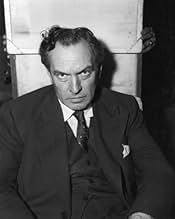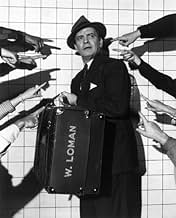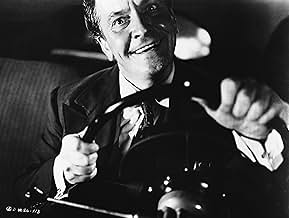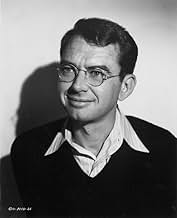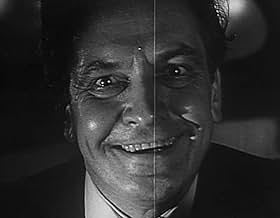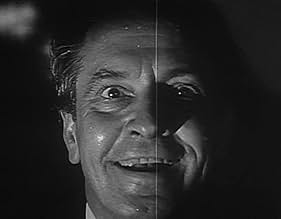IMDb-BEWERTUNG
7,2/10
1282
IHRE BEWERTUNG
Füge eine Handlung in deiner Sprache hinzuAn over-the-hill salesman faces a personal turning point when he loses his job and attempts to make peace with his family.An over-the-hill salesman faces a personal turning point when he loses his job and attempts to make peace with his family.An over-the-hill salesman faces a personal turning point when he loses his job and attempts to make peace with his family.
- Regie
- Drehbuch
- Hauptbesetzung
- Für 5 Oscars nominiert
- 8 Gewinne & 11 Nominierungen insgesamt
Beverly Aadland
- Girl
- (Nicht genannt)
Jeanne Bates
- Mother
- (Nicht genannt)
Gail Bonney
- Mother
- (Nicht genannt)
Roger Broaddus
- Boy
- (Nicht genannt)
Paul Bryar
- Subway Guard
- (Nicht genannt)
Patricia Edwards
- Letta
- (Nicht genannt)
Elisabeth Fraser
- Miss Forsythe
- (Nicht genannt)
Charles Morton
- Subway Passenger
- (Nicht genannt)
Empfohlene Bewertungen
This all but lost 1951 version of Arthur Miller's American masterpiece was nominated for several prestigious Academy Awards in 1952, including Best Picture. That it has never been officially released on video is a shame, for, quite simply, Fredric March's go around as Willy Loman is a absolute treasure. The supporting cast are uniformly excellent; the mood and tone are consistently melancholy; the sets are spare, even stagy; and, most important, the pace is as brisk as this play will allow. Please search out this one out on TV-- you will not be disappointed.
I recently have discovered Fredric March and have been watching several of his movies. Though I personally prefer his early films where he was the young and romantic hero, I found this movie to be a very good example of how broad his acting talent was. He was simply amazing as Willy Loman; he impressed me as being a truly desperate man at the end of his sanity. He should have been the one to win best actor during this year; instead it went to Humphrey Bogart for "The African Queen". Why, I don't know, for Fredric March's portrayal of Willie Loman was excellent. It brought tears to my eyes at the end,and I am not one to cry during a film; it takes something special for an actor to move me to tears.
The whole film had a darkness to it, it was very melancholy, depressing, desperate, hopeless...it is an emotionally exhausting film to watch. It does not leaving you sighing happily at the end. Still, I recommend you watch it for a wonderful performance by Fredric March.
The whole film had a darkness to it, it was very melancholy, depressing, desperate, hopeless...it is an emotionally exhausting film to watch. It does not leaving you sighing happily at the end. Still, I recommend you watch it for a wonderful performance by Fredric March.
Like many people ,I had seen the Schlondorff version starring Hoffman first,and I did like it.
This one should not be overlooked though :Arthur Miller's play,with its ceaseless to and fro between present and past , imaginary world and reality was not easy to transfer to the screen,and Laslo Benedek's directing is quite estimable:the scenes in the present are dark and make the house look like a tomb (notably when Willy comes back home) whereas the past which seems so bright is filmed in plain day light (the scene when young Biff and Happy polish the car );the subway is a good place to locate the events when willy has been fired;ditto for the final scene ,with all these 'living' night lights.The one thing which is passed over in silence is the boys' attitude after the funeral:Happy is "staying right in this city and gonna beat this racket,(...) and gonna win for him" whereas Biff "knows who he is" and that he perhaps will not never be able to settle down and take orders from somebody .
The cast is sensational:Fredric March gives a tormented performance ,switching back and forth between the extremes:sometimes proud of his athlete three colleges will take,often humble and bent in the office,where his boss is more interested in his tape recorder than in his salesman's future ;Mildred Dunnock is the patient mom,who trusts her dear husband ,even when the future seems bleak and he loses his mind ;Cameron Mitchell is Happy ,his dad's optimistic side ,a lady killer who thinks everything will work out fine (too bad his part is reduced in the last scene).Kevin McCarthy (film debut) is my favorite and he thoroughly deserved his AA nomination (he lost to Karl Malden 's Mitch in " a street car named desire): I love the way he talks about Bernhard ("he is liked ,but he is not well liked" ) ;he can be hilarious -the brief moment when he apes his teacher's lisp- or deeply moving when he breaks crying in his dad's arms ("Pop! I'm dime in a dozen and so are you!")His performance is at least as mind-boggling as that of John Malkovich thirty years later.
This one should not be overlooked though :Arthur Miller's play,with its ceaseless to and fro between present and past , imaginary world and reality was not easy to transfer to the screen,and Laslo Benedek's directing is quite estimable:the scenes in the present are dark and make the house look like a tomb (notably when Willy comes back home) whereas the past which seems so bright is filmed in plain day light (the scene when young Biff and Happy polish the car );the subway is a good place to locate the events when willy has been fired;ditto for the final scene ,with all these 'living' night lights.The one thing which is passed over in silence is the boys' attitude after the funeral:Happy is "staying right in this city and gonna beat this racket,(...) and gonna win for him" whereas Biff "knows who he is" and that he perhaps will not never be able to settle down and take orders from somebody .
The cast is sensational:Fredric March gives a tormented performance ,switching back and forth between the extremes:sometimes proud of his athlete three colleges will take,often humble and bent in the office,where his boss is more interested in his tape recorder than in his salesman's future ;Mildred Dunnock is the patient mom,who trusts her dear husband ,even when the future seems bleak and he loses his mind ;Cameron Mitchell is Happy ,his dad's optimistic side ,a lady killer who thinks everything will work out fine (too bad his part is reduced in the last scene).Kevin McCarthy (film debut) is my favorite and he thoroughly deserved his AA nomination (he lost to Karl Malden 's Mitch in " a street car named desire): I love the way he talks about Bernhard ("he is liked ,but he is not well liked" ) ;he can be hilarious -the brief moment when he apes his teacher's lisp- or deeply moving when he breaks crying in his dad's arms ("Pop! I'm dime in a dozen and so are you!")His performance is at least as mind-boggling as that of John Malkovich thirty years later.
This is the version people of my generation grew up on; it played on TV in the 50's, and being black and white non-widescreen and uncensorable, what we saw was what was filmed. Frederick March hammmed it up a bit, but in retrospect the play itself is hammmy (emotion-charged). It has been said Arthur Miller disliked the film, particularly the realistic representation of Willie's reveries and imaginings. Kevin McCarthy did a fine job as Biff. I loyally refused for years to watch Dustin Hoffman's version, but when I finally gave in I enjoyed his substantially different interpretation. But if he differed from March, then it follows March differs from him. In short, a whole other way of enjoying the greatest American soap opera ever penned.
Arthur Miller justifiably received a lot of acclaim for his Broadway stage version of DEATH OF A SALESMAN and this film version starring FREDRIC MARCH as Willie Loman is a faithful transfer of that work.
March is outstanding in his portrayal of a bitterly confused man who can't fathom why his life went so wrong, and CAMERON MITCHELL and KEVIN McCARTHY do outstanding work as the sons who are disillusioned by their father's failure. But the most memorable performance, in my estimation, comes from MILDRED DUNNOCK, who would go on to play similarly bitter women in her future roles on screen. But here she is poignant in what has to be one of the best character roles she ever had.
Surprisingly, the film is little seen today, seldom revived and largely forgotten. BRIAN DENNEHY did have success in a recent Broadway version and DUSTIN Hoffman has performed the role on TV. But the Fredric March version deserves to be seen, however heavy-handed the material is.
It's an exhausting experience, a story of one man's failure in life's journey, but dramatically very effective and it still has a lot to say.
March is outstanding in his portrayal of a bitterly confused man who can't fathom why his life went so wrong, and CAMERON MITCHELL and KEVIN McCARTHY do outstanding work as the sons who are disillusioned by their father's failure. But the most memorable performance, in my estimation, comes from MILDRED DUNNOCK, who would go on to play similarly bitter women in her future roles on screen. But here she is poignant in what has to be one of the best character roles she ever had.
Surprisingly, the film is little seen today, seldom revived and largely forgotten. BRIAN DENNEHY did have success in a recent Broadway version and DUSTIN Hoffman has performed the role on TV. But the Fredric March version deserves to be seen, however heavy-handed the material is.
It's an exhausting experience, a story of one man's failure in life's journey, but dramatically very effective and it still has a lot to say.
Wusstest du schon
- WissenswertesAccording to Arthur Miller, in a 2000 essay entitled, "Are You Now Or Were You Ever?" Columbia asked Miller to sign an anti-Communist declaration to ward off the threat of picket lines by the American Legion at theaters showing "Death of a Salesman". He refused. Instead, Columbia made another movie, a short film entitled "Life of a Salesman" to be shown with it. The short consisted of business professors from City College praising sales as a profession, and denouncing the character of Willy Loman. Miller wrote: "Never in show-business history has a studio spent so much good money to prove that its feature film was pointless."
- VerbindungenFeatured in Kaufen für die Müllhalde (2010)
Top-Auswahl
Melde dich zum Bewerten an und greife auf die Watchlist für personalisierte Empfehlungen zu.
- How long is Death of a Salesman?Powered by Alexa
Details
- Erscheinungsdatum
- Herkunftsland
- Offizieller Standort
- Sprache
- Auch bekannt als
- Death of a Salesman
- Produktionsfirma
- Weitere beteiligte Unternehmen bei IMDbPro anzeigen
- Laufzeit1 Stunde 48 Minuten
- Farbe
- Seitenverhältnis
- 1.37 : 1
Zu dieser Seite beitragen
Bearbeitung vorschlagen oder fehlenden Inhalt hinzufügen

Oberste Lücke
By what name was Der Tod eines Handlungsreisenden (1951) officially released in India in English?
Antwort
